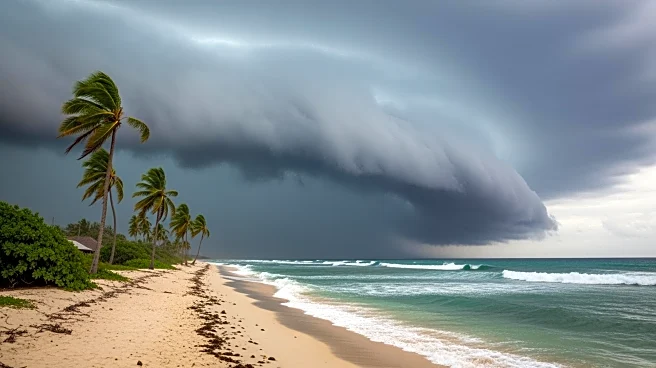What's Happening?
Typhoon Fung-wong has exited the northwestern Philippines after causing significant destruction, including floods and landslides. The typhoon resulted in the deaths of at least two individuals and displaced
over 1.4 million people. The storm initially made landfall in Aurora province as a super typhoon, with winds reaching up to 185 kph and gusts of 230 kph. As it moved through the northern provinces, it weakened but continued to cause damage, including flooding in 132 villages and damage to approximately 1,000 homes. The Philippine government has declared a state of emergency due to the extensive damage caused by Fung-wong and the preceding Typhoon Kalmaegi.
Why It's Important?
The impact of Typhoon Fung-wong highlights the vulnerability of the Philippines to severe weather events, which can lead to significant human and economic costs. The displacement of 1.4 million people underscores the urgent need for effective disaster preparedness and response strategies. The declaration of a state of emergency allows for the mobilization of resources and aid to affected areas, but also raises questions about the long-term resilience of infrastructure and communities in the face of increasingly frequent and severe weather disturbances. The situation may prompt international assistance, with countries like the United States and Japan ready to provide support.
What's Next?
As the typhoon moves away from the Philippines, efforts will focus on rescue, relief, and disaster-response operations. Authorities are working to clear roads blocked by landslides and provide aid to those in evacuation centers. The government has closed schools and most offices to prioritize safety and recovery efforts. The international community may offer assistance, and the Philippines will need to assess and rebuild affected areas while considering strategies to mitigate future risks.
Beyond the Headlines
The recurring nature of such typhoons raises concerns about climate change and its role in intensifying weather patterns. The Philippines, being an archipelago, faces unique challenges in disaster management and climate adaptation. The events may spur discussions on global climate policies and the need for sustainable development practices that enhance resilience against natural disasters.










